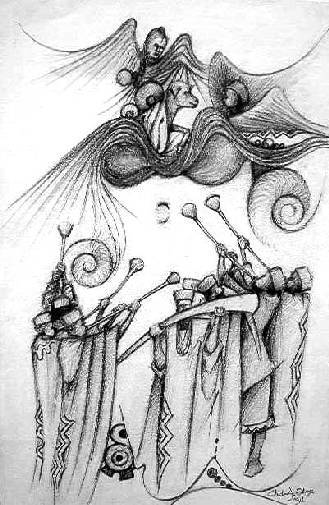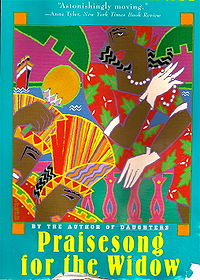Paule Marshall
March 20, 2009

“I grew up among poets. Nothing about them suggested that poetry was their calling. They were just a group of ordinary housewives, my mother included — the basement kitchen of the brownstone house where my family lived was the usual gathering place. Once inside the warm safety of its walls the women threw off the drab coats and hats, seated themselves at the large center table, drank their cups of tea or cocoa, and talked while my sister and I sat at a smaller table over in a corner doing our homework, they talked- endlessly, passionately, poetically and with impressive range. No subject was beyond them.
When people at readings and writers’ conferences asked me who my major influences were, they are sometimes a little disappointed when I don’t immediately name the usual literary giants. True, I am indebted to those writers, white and black, whom I read during my formative years and still read for instruction and pleasure. But they were preceded in my life by another set of giants whom I always acknowledge before all others; the group of women around the table long ago-this is why the best of my work must be attributed to them; it stands as testimony to the rich legacy of language and culture they so freely passed on to me in the wordshop of the kitchen.” —The Making of a Writer: From the Poets in the Kitchen
Recent New York Times interview
“There is so much in the West Indian culture that has that African flavor,” she said. “This is my attempt to get a fuller picture. We need to see the triangular nature of our inheritance and our place in the world. I think that’s what Obama suggests in his person and what people saw in him.”
African Praise Song Tradition
March 19, 2009
Praisesong for the Widow Critical Analysis
March 18, 2009
Tradition in Contemparary Performance
March 6, 2009
Linda, a 2006 Transformation Awardee, is a storyteller who uses the medium to inspire people to respond to inequity in the world and to share a vision for hope, freedom, healing, and justice. Linda’s stories are in the tradition of her African and African American ancestors, and tell of how people make choices and face power. Her repertoire is vast, with stories ranging from those passed down to her by family members, oral histories, folktales from the African American oral tradition, and original pieces. She is an agent for social change; her storytelling legitimizes and validates everyday stories, naming peoples’ experiences. Her art is built upon the transformative power of storytelling, empowering all people to acknowledge, know, and express their own stories, which she sees as a radical act in these repressive times. They also teach long-term African American community survival strategies, by telling stories that have helped generation of Black people endure and continue to struggle. After an experience in 1982 when she was one of two Black storytellers at a national storytellers gathering, Linda organized with other storytellers to create their own festival, In the Tradition: National Black Storytelling Festival, which, in 1984, gave birth to the National Association of Black Storytellers, established as a space to bring out stories from the community. That same year, Linda was named the Official Storyteller of Philadelphia by the Mayor. She has worked for over 30 years in the Philadelphia community, from circles for mothers to share stories of murdered children to circles for breast cancer survivors to documenting community stories in North Philadelphia with the Village of Art and Humanities “Bearing Witness: Invoking Spirit, Embracing Memory” Project.
 Britannica Article
Britannica Article

